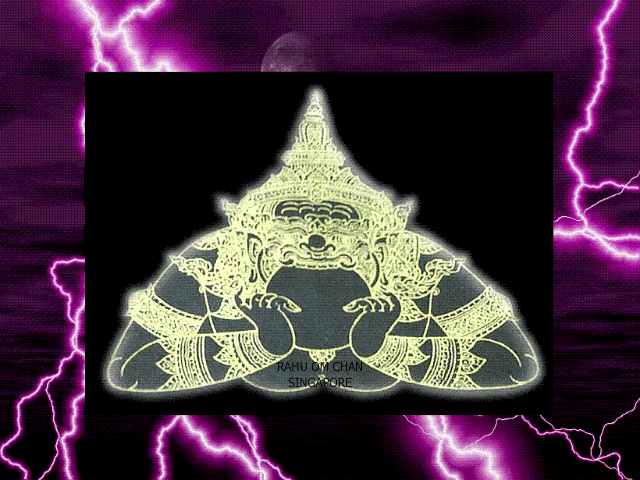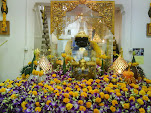Wednesday, 26 November 2008
4 bomb attacks rock Bangkok
The number of explosions and injuries was still confusing at press time.
Three explosions were heard outside the outbound passenger terminal of the Suvarnabhumi International Airport at 4:30 am.
The explosion sounds frightened the protesters as police vehicles rushed to the scene. The protesters feared that police would come to violently disperse them. But their leaders managed to calm them down minutes later.
Thai PBS reported that four protesters were injured, two severely in the Suvarnabhumi explosions.
The fourth explosion happened at 6.30am at the Don Muang Airport, where protesters led by the Peoples Alliance for Democracy were rallying.
The figure of injured protesters at Don Muang airport was still confusing.
Channel 3 reported that two were injured but Channel 9 reported that five were injured, two severely.
Channel 3 added that a grenade was also launched at the protesters but it did not explode. And 2 men were injured by bomb shrapnel and one was shot when a group of men hurled two bombs and fired at the 92.75 community radio station for taxi drivers.
Police said the attack happened at 4:30 am.
The station was located inside Vibhavadi Rangsit Soi 3 where dozens of PAD guards attacked taxi drivers Tuesday evening.
A taxi driver, who identified himself as Watcharin, said he and friends were standing at the mouth of the soi and suddenly heard two explosions and the assailants also opened fire at them.
The injured were rushed to the Rajvithi Hospital.
The first explosion occurred on the Dusit Bridget in Bangkok's Dusit district at 2 am Wednesday, police said.
No one was injured in the explosion which caused a small crack at one side of the bridge.
Police found a safety pin of an M26 grenade at the scene. Police quoted eyewitnesses as saying they saw two men on a motorcycle speeding from the direction of the Government House. The pillion rider hurled the bomb to the bridge and they sped away.
Source - By The Nation
**其实早在昨天就有一个在泰国的叔叔告诉我这两天一定有大事情发生,但是因为太忙了,不当一回事.原来消息是那么准确的. 还好亲人都赶在昨天下午回来了,不然真的要担心死了.
Sunday, 23 November 2008
有一天, 这个年轻人听别人说起远方的山上有位得道的高僧,心里不免仰慕,便想去向高僧讨教成佛之道,但他又怕母亲阻拦,便瞒着母亲偷偷从家里出走了。 他一路上跋山涉水,历尽艰辛,终于在山上找到了那位高僧。高僧热情地接待了他。席间,听完他的一番自述,高僧沉默良久。当他向高僧问佛法时,高僧开口道:“你想得道成佛,我可以给你指条道。吃过饭后,你即刻下山,一路到家,但凡遇到有赤脚为你开门的人,这人就是你所谓的佛。你只要悉心侍奉,拜他为师,成佛又有何难?” 年轻人听后大喜,遂叩谢高僧,欣然下山。
第一天,他投宿在一户农家,男主人为他开门时,他仔细看了看,男主人没有赤脚。
第二天,他投宿在一座城市的富有人家,更没有人赤脚为他开门。他不免有些灰心。
第三天,第四天......他一路走来,投宿无数,却一直没有遇到高僧所说的赤脚开门人。他开始对高僧的话产生了怀疑。快到自己家时,他彻底失望了。
日暮时,他没有再投宿,而是连夜赶回家。到家门时已是午夜时分,疲惫至极的他费力地叩动了门环。屋内传来母亲苍老惊悸的声音:“谁呀?”“我,你儿子。”他沮丧地答道。
很快地,门开了,一脸憔悴的母亲大声叫着他的名字把他拉进屋里。就着灯光,母亲流着泪端详他。这时他一低头,蓦地发现母亲竟赤着脚站的冰凉的地上!
刹那间,灵光一闪,他想起高僧的话。他突然什么都明白了。年轻人泪流满面,“扑通”一声跪倒在母亲面前。
**母亲对于我们每个人来说,永远都是伟大的。在你失意,忧伤甚至绝望的时候,千万不要忘记你的母亲会全力的支持你,永远不会放弃你。
Saturday, 22 November 2008
為妹妹輸血的男孩
然而災難再一次降臨在這兩個不幸的孩子身上。妹妹染上重病,需要輸血。但醫院的血液太昂貴,男孩沒有錢支付任何費用,儘管醫院已免去了手術費,但不輸血的話妹妹仍會死去。作為妹妹唯一的親人,男孩的血型和妹妹相符。醫生問男孩是否勇敢,是否有勇氣承受抽血時的疼痛。男孩開始猶豫,10歲的大腦經過一番思考,終於點了點頭。抽血時,男孩安靜地不發出一絲聲響,只是向著鄰床上的妹妹微笑。抽血完畢後,男孩聲音顫抖地問:「醫生,我還能活多長時間?」
醫生正想笑男孩的無知,但轉念間又被男孩的勇敢震撼了:在男孩10歲的大腦中,他認為輸血會失去生命,但他仍然肯輸血給妹妹。在那一瞬間,男孩所做出的決定是付出了一生的勇敢,並下定了死亡的決心。
醫生的手心滲出汗,他緊握著男孩的手說:「放心吧,你不會死的。輸血不會失去生命!」 男孩眼中放出了光彩:「真的?那我還能活多少年?」
醫生微笑著,充滿愛心地說:「你能活到100歲,小伙子,你很健康!」男孩高興得又蹦又跳。他確認自己真的沒事時,就又挽起剛才被抽血的胳膊,昂起頭,鄭重其事地對醫生說:「那就把我的血抽一半給妹妹吧,我們兩個每人活50年!」
心靈絮語
孩子的愛,有時更加純潔和感人。
Thursday, 20 November 2008
 I once know of a group of people who always go to Wat Don Chan, Chiangmai to cook for the Orphans in the temple and donated money on a regular basis. They no longer doing it and it's kind of disappointing.
I once know of a group of people who always go to Wat Don Chan, Chiangmai to cook for the Orphans in the temple and donated money on a regular basis. They no longer doing it and it's kind of disappointing.Lately when I check out the web for this temple, I'm really happy to know that there are foreign volunteers/organization who offer great help to them. Some examples are
- Toys for Thailand - http://www.toysforthailand.org/
- Dreams can come True Foundation - http://www.dcct.org/
- The Chiangmai Family Services - http://www.familycare.org
These organization not only collect donation to improve the facilities ( bed, toilet and shower facility ), they also make sure that there will be sufficient food to feed all the 650 children. They teach the children 4 subjects; art (including painting, handicrafts and jewellery crafting), English, sports (including music and dancing), and photography. They can sell the handicraft and proceed will go to the Temple for future use.
Wednesday, 19 November 2008
Inserting Takrut / Lek Lai inserting ritual
For more than 20 years, Luang Por Koon had chanted and inserted Takrut for devotees but now He had stopped due to poor health. I’ve met someone today with the Takrut under his arm, I was given permission by him to touch it and the feeling is~~ weird, by seeing, you can’t tell that THERE is something inside, but when I started to touch it, I can really feel something inside the arm.
According to him, he did it for blessing of good health. His wife also has one and there was an incident when a doctor was trying to get some blood sample from her, despite several injection, there was no blood ( Believe it or not, she don’t feel the pain at all) and immediately he reminded her that she should try the other side of her hand and within second, blood flows out.
Out of curiosity, I asked him if it’s painful and to my surprised, he said that the pain was during the time when the monk pull the skin of his arm before placing it on a surface, but the moment when he use the piece of wood to "knock" the gold takrut inside his arm, the pain is still bearable and no bloody scenes at all.
These Takrut are very well proven to protect a person from accidents, Metta and as well as Kong Grapan (immunity from weapons). I found some interesting info on Lek lai insertion ritual, which i guess should be similar to what LP Koon did.
"Lek Lai", the mythical Thai-originated magical metal amulet said to possess supernatural powers against evil elements and life-threatening situations. Lek Lai literally means fluid metal in Thai. It usually comes in various shapes, like a capsule, a tiny ball, a turtle, etc. It exists in the crevices of some caves. Legend has it that if one is in possession of a genuine Lek Lai, he would be able to survive three consecutive gun shot, it is said to be a favourite talisman among the Thai enforcement officers.
The monk who perform this ritual would use a ‘sacred wooden hammer’ and a metal hole-puncher to punch a hole through the skin near the upper arm of the devotee concerned.He would then insert the Lek Lai, which usually measures slightly smaller than a "tic-tac", into the devotee’s body through the said hole.
Saturday, 15 November 2008
Friday, 14 November 2008
Wat Phra Yai - Big Buddha

This temple is the home of Koh Samui's most famous landmark the Big Buddha.Visible from several kilometers away and even from the air when arriving on or leaving the island , the 12 meter tall golden image stands proud.
The Buddha statue is called Phra Buddha Kodom, was built in 1972.
Thursday, 13 November 2008
Fasting Buddha
 The young prince Siddharatha left his palace in search of enlightenment and practised for six years such severe austerities and intense mental concentration that his beautiful body withered away to skin and bones. Ultimately he attained enlightenment at the age of thirty five and became known as the Buddha "The enlightened one".
The young prince Siddharatha left his palace in search of enlightenment and practised for six years such severe austerities and intense mental concentration that his beautiful body withered away to skin and bones. Ultimately he attained enlightenment at the age of thirty five and became known as the Buddha "The enlightened one".Monday, 10 November 2008
Trimurti- 三尊天神的合体
- 四面神 - 也称《创造神》
- 毗湿奴 - 《保护神》
- 舌娃 - 《破坏神》
集合了以上3神的力量,就是祂强大的力量,有风,火和阳光的能量:火能把不好的一切燃烧,风能让生物呼吸,而所有生物所不能缺少的必然是阳光。祂的三个脸,第一面代表家庭圆满,感情顺利,第二面带白了稳定的财富,第三面是事业,名利都顺利。
参拜祂的供品~9支红香,一对红蜡烛,9朵红玫瑰(也可以用一串红玫瑰代替),红色的水果,甘蔗汁和鲜奶。千万不可以用荤食和熟食。
大家可以在星期四晚上九点半的时候参拜和许愿。 千万要记得,如果你们对祂做出任何承诺,记得一定要还愿。
Saturday, 8 November 2008
The Trimurti Shrine
.jpg) Trimurti refers to the Trinity of Hindu Gods consisting of Brahma the creator, Vishnu the sustainer and Siva the destroyer, the three most important gods in Hinduism.The deity is a gold statue of a human body with two heads and four arms. The heads are one on top of the other; the lower head has four faces.
Trimurti refers to the Trinity of Hindu Gods consisting of Brahma the creator, Vishnu the sustainer and Siva the destroyer, the three most important gods in Hinduism.The deity is a gold statue of a human body with two heads and four arms. The heads are one on top of the other; the lower head has four faces.There's an open area around the shrine with a ring of seats for worshippers to sit and reflect.
Crafted in classical Indian sculpture with a Thai touch, the statue is a replica of the original from old Ayutthaya.
Legends build upon themselves and as the fame of the shrine grew, so did the flock of faithful. Such is the renown of the shrine that it's sometimes referred to as the Lovers' Shrine.There's an air of peace and serenity around the shrine and the place just has a natural draw for people.
.jpg) The Chao Mae Tuptim shrine is located on the grounds of the Nai Lert Bangkok Hotel (Swissotel) on Wireless Road.
The Chao Mae Tuptim shrine is located on the grounds of the Nai Lert Bangkok Hotel (Swissotel) on Wireless Road. This Shrine is dedicated to Phra Mae Tuptim. A sign at the site indicates that the precise origin of the shrine is unknown. It was likely erected by Nai Lert as a spirit house for the spirit that was believed to reside in the large ficus tree on the spot.
Traditional offerings always included jasmine flowers, incense sticks and lotus buds. However over the years less traditional offerings were given, and now the area around the shrine is occupied by numerous small and large lingams or phallic symbols. As such it is believed the shrine is dedicated to fertility (and good luck).
Tall cylinders of stone (called "lingams") are worshipped as the phallic images of Hindu god Shiva.
It is said that women who pray here in a wish to become fertile for pregnancy, will return if their wish is fulfilled, and place another phallus at the shrine in thanks.
Thais occasionally dangle a tiny wooden phallus from their belt or necklace, for added protection. Modern Thais are familiar with wooden penises which are sold in markets as good luck amulets. Sometimes, a shop or restaurant will display a wooden penis in a discreet location, hoping it will help business.
Thursday, 6 November 2008
Ghost residing in a tree ( ผีต้นไม้ )
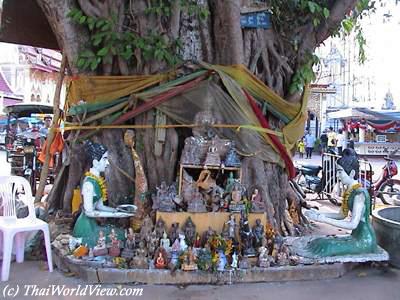 Do you find this familiar? This is a common sight in thai temple. Everywhere in Thailand, some trees are wrapped with a cloth. Especially in temples but also in forests. It means that a spirit inhabits the tree. Of course the tree shall not be cut without warning the spirit in order to let him find another tree.
Do you find this familiar? This is a common sight in thai temple. Everywhere in Thailand, some trees are wrapped with a cloth. Especially in temples but also in forests. It means that a spirit inhabits the tree. Of course the tree shall not be cut without warning the spirit in order to let him find another tree.ผีต้นไม้ or "PHI TON MAI" means "ghosts that reside in tree". They are generally classified into two categories, i.e. benovolent and malevolent spirits. There is often a certain spirit associated to a certain type of tree such as banana tree.
นางไม้ "NANG MAI" is a female spirit inhabiting a tree. Other famous spirits are นางตะเคียน or "NANG TAKIAN" located in hopea trees and นางตานี or "NANG TANEE" located in banana trees.
To protect forests against logging, some monks ordain trees and wrapped them up with a thin orange cloth. Trees were then sacred. For Bouddhist people it was now impossible to harm the trees. Alas sometimes officials used another monk to defrock the trees.
source~thaiworldview.com
Wednesday, 5 November 2008
Renting of Buddha Statues
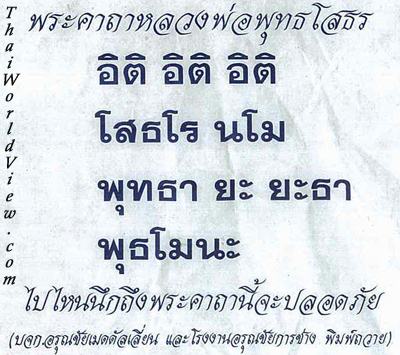
Tuesday, 4 November 2008
Walk On Back~Miracle Healing
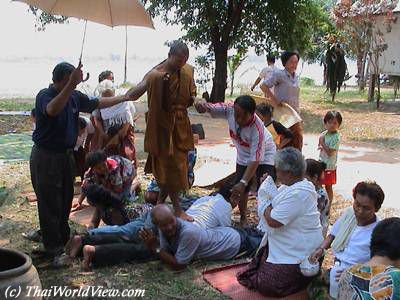 This ceremony starts by a Buddhist sermon in the hall for sermons ("SALA" - ศาลา).
This ceremony starts by a Buddhist sermon in the hall for sermons ("SALA" - ศาลา).This ceremony is supposed to ease back pain for old and middle aged folks.
The monk walks on people back and pour holy water on their back. Before the monk walks on their back, Thai people make a Thai greeting ("WAI" - ไหว้). Thai people make a small donation to thank the monk
source: Thai world view
Monday, 3 November 2008
Holy Money
The image of King RAMA V and Phra Buddhasothorn. I wonder if i keep them in my wallet, will my money will grow??
Saturday, 1 November 2008
LP NGERN OF WAT-BANG-KLAN
LP Ngern 16.06.1810~1919
Monk NGERN" was name "NGERN" or meaning Money. He was born on Friday 16-sep-1810 at Pi-Jit province,Thailand.
He entered monkhood when he was 12 years old to become a senior student of Luang Phor Suk. When he is 25, he returned to wat bang klan in pichit province.
LP Ngern was famous of making HOLY WATER and the famous story of him was ~~ Krom Luang chumporn, the son of King Rama V was the favourite student of LP Suk. LP suk entrusted him to LP Ngern after he had completed his incantation study. When Krom Luang chumporn arrived at wat Bang Klan by boat without prior notice, LP Ngern exhibited miracle power by walking on the water surface to greet him in the middle of the river. And when prince asked how did he know of his arrival, he replied " LP Suk had told me through telepathy"!
He died in year 1919 when he was 109 years Old and was the top 5 Famous monk in Thailand.
